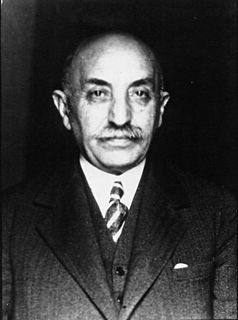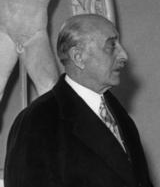
Georgios Papandreou was a Greek politician, the founder of the Papandreou political dynasty. He served three terms as prime minister of Greece. He was also deputy prime minister from 1950–1952, in the governments of Nikolaos Plastiras and Sofoklis Venizelos and served numerous times as a cabinet minister, starting in 1923, in a political career that spanned more than five decades.

The Union of Centrists is a centrist, liberal political party in Greece. The leader and founder of the party is Vassilis Leventis. It strongly supports Greece's remaining an integral part of the European Union.
This article gives an overview of liberalism in Greece. It is limited to liberal parties. The sign ⇒ denotes another party in that scheme. For inclusion in this scheme it isn't necessary so that parties labeled themselves as a liberal party.

Nikolaos Plastiras was a Greek general and politician, who served thrice as Prime Minister of Greece. A distinguished soldier known for his personal bravery, he became famous as "The Black Rider" during the Greco-Turkish War of 1919-1922, where he commanded the 5/42 Evzone Regiment. After the Greek defeat in the war, along with other Venizelist officers he launched the 11 September 1922 Revolution that deposed King Constantine I of Greece and his government. The military-led government ruled until January 1924, when power was handed over to an elected National Assembly, which later declared the Second Hellenic Republic. In the interwar period, Plastiras remained a devoted Venizelist and republican. Trying to avert the rise of the royalist People's Party and the restoration of the monarchy, he led two coup attempts in 1933 and 1935, both of which failed, forcing him to exile in France.

Parliamentary elections were held in Greece on 13 June [O.S. 31 May] 1915. The result was a landslide victory for Eleftherios Venizelos and his Liberal Party, winning 187 of the 316 seats in Parliament. Venizelos claimed that his win was proof that the Greek people approved his pro-Allies policy.

Parliamentary elections were held in Greece on 1 November 1920. They were possibly the most crucial elections in the modern history of Greece, influencing not only the few years afterwards, including the country's defeat by Kemal Atatürk's reformed Turkish army in 1922, but setting the stage for Greece's political landscape for most of the rest of the 20th century. It had been nearly five years since the last election, a period during which all democratic procedures were suspended due to the National Schism, when Prime Minister Eleftherios Venizelos announced that the elections would take place on 25 October. However, after the unexpected death of King Alexander, who had assumed the throne after the exile of his father, King Constantine I, the elections were postponed until 1 November.

Parliamentary elections were held in Greece on 5 March 1933. The pro-monarchist People's Party emerged as the largest party, winning 118 of the 248 seats in Parliament, ending the predominance of Eleftherios Venizelos' Liberal Party. The results triggered an attempted coup by Venizelist officers. A military emergency government under Alexandros Othonaios was instituted which suppressed the revolt, and was succeeded by a People's Party cabinet under Panagis Tsaldaris on 10 March.

A referendum on the return of King Constantine I was held in Greece on 22 November 1920. It followed the death of his son, King Alexander. The proposal was approved by 99.0% of voters. The antivenizelist parties had recently won the elections of 1920. However the referendum is considered illegitimate by modern Greek historians.

Parliamentary elections were held in Greece on 19 December [O.S. 6 December] 1915. They were boycotted by Eleftherios Venizelos and his party, the Liberal Party, as unconstitutional, a result of a confrontation with King Constantine I over the country's participation in World War I. Venizelos considered Greece as a close and loyal ally of the United Kingdom and France, while Constantine I, who was affiliated with the German royal family, favored neutrality.

Parliamentary elections were held in Greece on 31 March 1946. The result was a victory for the United Alignment of Nationalists, an alliance that included the People's Party, the National Liberal Party, the Reform Party, which won 206 of the 354 seats in Parliament. As a result Konstantinos Tsaldaris became Prime Minister leading a right-wing coalition. Nonetheless, he soon decided to resign in favor of Themistoklis Sophoulis, who led a government of national unity during the entire second phase of the civil war (1946–1949). One of the priorities of the new government was the proclamation of a plebiscite for the restoration of the Greek monarchy.

Parliamentary elections were held in Greece on 19 February 1956. The result was a victory for Constantine Karamanlis and his National Radical Union party by securing the electoral vote despite trailing in the popular vote. It was the first general election in Greece in which women had the right to vote, although women had first voted in a by-election in Thessaloniki Prefecture in 1953 in which the first female MP was elected.
A referendum on becoming a republic was held in Greece on 13 April 1924. It followed the catastrophic outcome of the Asia Minor Campaign. As a result of the military defeat, King Constantine I was forced to abdicate in favor of his son, King George II. King George himself later went into exile in Romania, the home of his wife, while the government debated the fate of the monarchy. Ultimately, a plebiscite was called. This referendum, following the restoration of Constantine I in 1920, reflected the see-saw nature of the Greek electorate and the then-present dominance of the Liberal and Republican Venizelists in Greek politics and abolished the Crown. Prime Minister Alexandros Papanastasiou favoured the vote for the Republic, while Venizelos kept a neutral stance.

Parliamentary elections were held in Greece on 9 September 1951. They resulted in an ambivalent outcome, consisting a narrow and pyrrhic, as proven later, victory for the ruling center-liberal parties of Sophoklis Venizelos and Nikolaos Plastiras.

Panagis Tsaldaris was a Greek politician and the 48th Prime Minister of Greece. He was a revered conservative politician and leader for many years (1922–1936) of the conservative People's Party in the period before World War II. He was the husband of Lina Tsaldari, a Greek suffragist, member of Parliament, and the Minister for Social Welfare.
The National Political Union was a political alliance in Greece in the 1940s.

The attempted coup d'état of March 1935 was a Venizelist revolt against the People's Party government of Panagis Tsaldaris, which was suspected of pro-royalist tendencies.
The National Democratic Party, later renamed National Radical Party, was a political party in Greece in the 1920s led by Georgios Kondylis.





















